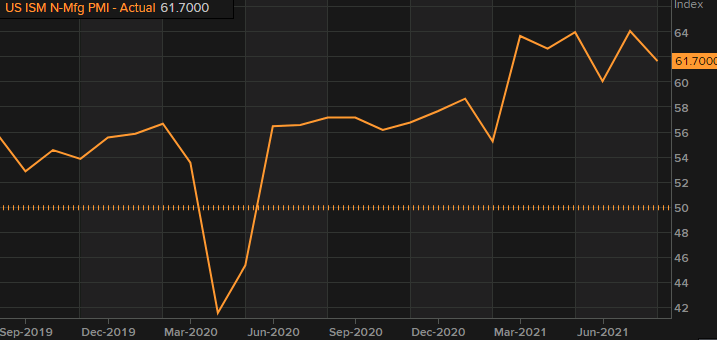ISM services index for August 2021:
- Prior was 64.1
- Employment 53.7 vs 53.8 prior
- New orders 63.2 vs 63.7 prior
- Prices paid 75.4 vs 82.3 prior
- Business activity 60.1 vs 67.0 prior
- Backlog of orders 61.3 vs 63.5 prior
- New export orders 60.6 vs 65.8 prior
- Imports 48.7 vs 51.6 prior
- Inventories 46.9 vs 49.2 prior
This is close to expectations but I’ll take it as encouraging as it stops the bleeding on a month-long series of data misses. The flat employment number also raises some questions about the disappointing non-farm payrolls reading.
Comments in the report all focus on bottlenecks in products and labor shortages:
- “Supply chain disruptions – including manufacturing-labor shortages,
logistics delays and lack of material to make products – are
significantly disrupting our business.” [Accommodation & Food
Services] - “There is a shortage of available workers which is challenging our
business operations.” [Agriculture, Forestry, Fishing & Hunting] - “Material and labor shortages continue to hinder productivity. Price
increases are ever-present and repetitive. Large, multinational
manufacturers have had multiple price increases in the last three
months.” [Construction] - “Budget constraints due to student enrollment (impacted by) COVID-19
restrictions. Outlook to remain flat or little increase. Supply chain
constraints with regard to limited supply of computer hardware to
fulfill orders.” [Educational Services] - “Inpatient- and outpatient-services and ancillary-services volumes
continue to be very high. Driven by increased admissions and increased
lengths of stay. Pharmaceutical volume is high as well, which relates to
patient volume in our cancer center. Surgical-case volumes remain
strong, as do associated physician services. Emergency room visits
exceeded budgeted levels by 14.2 percent. This volume resulted in an
increase in diagnostic services, specifically CT scans. In addition, we
are seeing an increase in COVID-19 patients again.” [Health Care &
Social Assistance] - “Supplies are tight in technology hardware.” [Information]
- “Temporary labor continues to be in short supply. Transportation
costs are inflating prices on all products.” [Management of Companies
& Support Services] - “Activity level continues to increase.” [Mining]
- “Continuing supply chain disruptions and supply cost increases.” [Professional, Scientific & Technical Services]
- “Chemicals and transportation services are in short supply. Also,
chip shortages are affecting several large-project time lines.” [Public
Administration] - “Business in all segments continues to gain, both month over month
and year-to-date versus 2020. Projections and forecasts remain quite
robust.” [Real Estate, Rental & Leasing] - “A limited supply of critical items has caused us to expand our line
of products and our supplier base. Services like ash cleaning, trash
removal, internet installations and the like are experiencing staffing
shortages, causing us to find alternative sources or adjust schedules.
Travel has increased 60 percent since February for internal employees.”
[Retail Trade] - “Steel shortages continue. Labor constraints at suppliers continue
to push delivery dates out. Logistics issues (are also ongoing), as
container space, truck drivers and the like remain difficult to obtain.”
[Wholesale Trade]
This article was originally published by Forexlive.com. Read the original article here.
